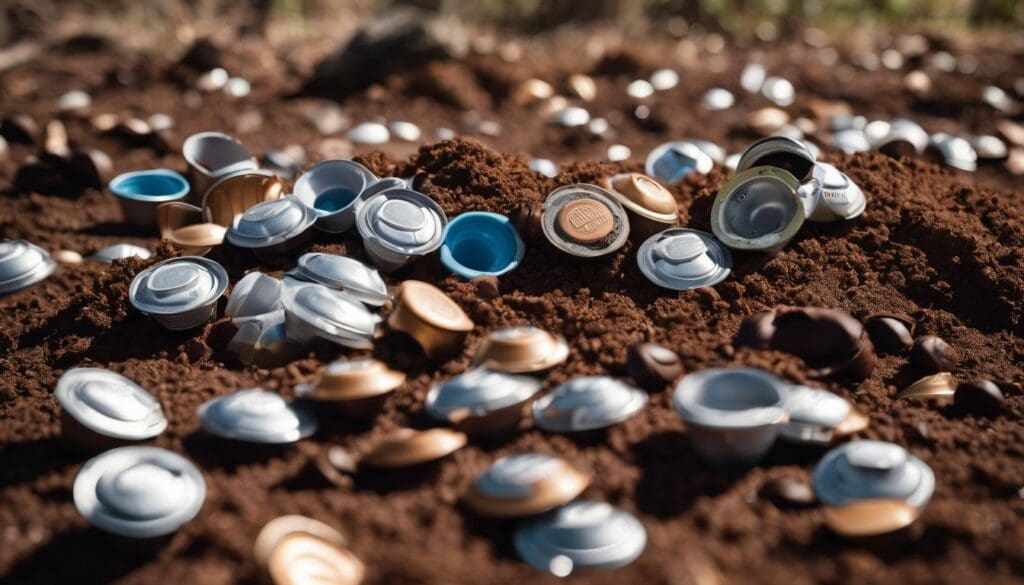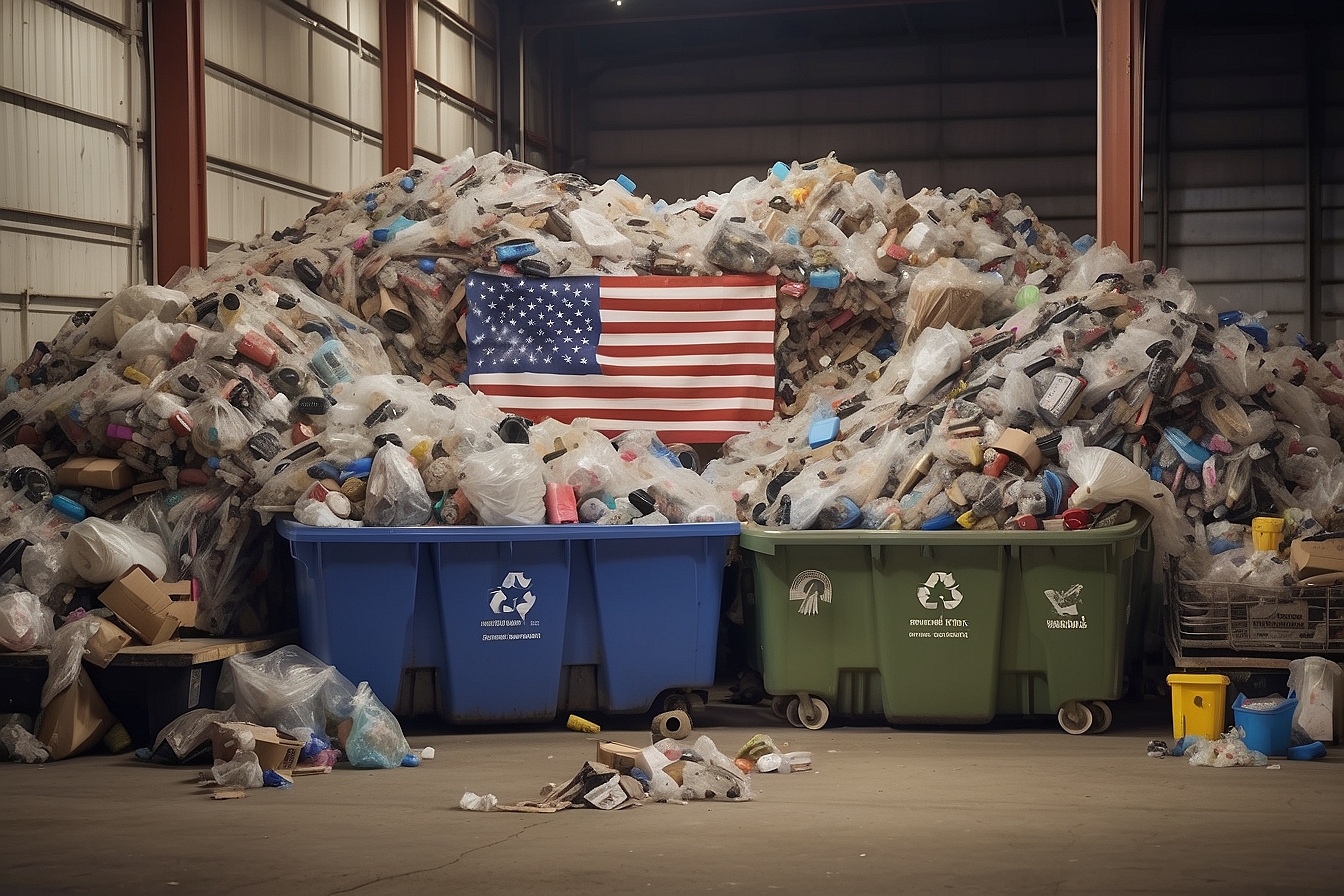There’s something rather special about that first sip of coffee in the morning, isn’t there? But whilst we cherish this daily ritual, there’s an inconvenient truth lurking behind those speedy little pods.
Just like you, we were quite taken aback to learn that more than 20 million single-use coffee pods are disposed of every day. It’s a staggering figure that contributes to our planet’s growing waste problem.
Fear not though – within these lines, we’ll delve into some clever ways to reduce this impact and how we can all adopt more sustainable practices for our beloved brews. So go on then, keep reading; after all, change is most definitely brewing!
Key Takeaways
- Coffee pods add significantly to waste with over 20 million discarded daily, presenting serious environmental issues like increased landfills and emissions.
- Recycling coffee pods through dedicated facilities and collection programs is vital, as is embracing compostable options to reduce their environmental footprint.
- Reusable coffee pods, traditional brewing methods, and refillable pod systems are sustainable alternatives that can help decrease the use of single-use plastic capsules.
- Understanding the health risks and the negative impact on our planet from certain coffee pods will enable informed decisions towards eco-friendliness.
- Active support for recycling initiatives coupled with a shift in consumer habits can drive a reduction in waste from single-use coffee pods.
The Environmental Impact of Coffee Pods
Coffee pods have a significant environmental impact, contributing to emissions during production and waste after use. The sheer volume of single-use coffee pods being discarded annually is causing concern for the environment.
Emissions
We often overlook the carbon footprint that comes with our morning brew, but it’s a real concern. The production and disposal of single-use coffee pods add significantly to greenhouse gas emissions.
These little capsules seem convenient, yet they demand energy for manufacturing, transport, and waste management.
Our daily choices have a huge impact on the planet. Aluminium coffee pods might look sleek, but their production is energy-intensive and contributes to environmental pollution. We need to acknowledge this aspect of our caffeine routine and push for sustainable solutions that cut down these emissions.
Let’s commit ourselves to reducing waste from single-use coffee pods by supporting eco-friendly alternatives or advocating for better recycling facilities that manage coffee capsule waste effectively without harming our environment.
Waste
Addressing the problem of coffee pod waste is crucial for a sustainable future. Coffee pods contribute to a significant amount of waste that ends up in landfills, posing environmental challenges.
Recycling coffee pods and embracing compostable and sustainable alternatives are effective ways to reduce the impact on our planet. By reevaluating the need for single-use coffee pods and opting for eco-friendly options, we can actively work towards managing coffee capsule waste and promoting green living.
Recycling statistics for coffee pods highlight the urgent need for circular solutions in managing their environmental impact. Supporting renewable resources and advocating for sustainable coffee packaging reinforces our commitment to reducing waste from single-use products.
Solutions for Reducing Coffee Pod Waste
Recycling and recovery techniques can help to reduce the environmental impact of coffee pods, while sustainable alternatives such as compostable coffee pods offer a more eco-friendly option.
Reevaluating the need for single-use coffee pods is also an important step towards reducing waste and protecting our environment.
Recycling and recovery techniques
Reducing coffee pod waste is crucial, and we can actively contribute to the environment by adopting responsible recycling and recovery techniques.
- Consider using dedicated coffee pod recycling facilities that accept used pods for proper processing.
- Look for collection programs that partner with local authorities or retailers to facilitate convenient drop-off points for used coffee pods.
- Explore recovery techniques such as composting, where certain compostable coffee pods can be broken down naturally.
- Seek out circular solutions for coffee capsules that involve repurposing materials from used pods into new products, reducing overall waste.
Sustainable alternatives
Now that we’ve explored recycling and recovery techniques, let’s consider sustainable alternatives to single-use coffee pods. Here are some eco-friendly options for environmentally conscious individuals:
- Reusable coffee pods: These can be filled with your favourite ground coffee and used multiple times, reducing the need for single-use plastic pods.
- Compostable coffee pods: Made from biodegradable materials, these pods can be disposed of in compost bins, minimising environmental impact.
- Traditional brewing methods: Opt for a French press, pour-over, or espresso machine that uses ground coffee instead of pods.
- Refillable pod systems: Some companies offer refillable pod systems that allow you to fill and reuse your own pods with freshly ground coffee.
Reevaluating the need for coffee pods
As we explore sustainable alternatives, it’s crucial to reevaluate the need for coffee pods. Considering the environmental impact and excessive waste generated by single-use coffee pods, it’s essential to question their necessity.
By acknowledging the health risks associated with certain types of coffee pods and understanding the detrimental effects of their production and disposal on our planet, we can make informed choices about our consumption habits.
Reevaluating the need for coffee pods encourages us to seek eco-friendly and sustainable options that align with our values of conservation and environmental responsibility.
Empowering ourselves with knowledge about the environmental impact of coffee capsules enables us to advocate for better solutions while being mindful of reducing waste from single-use plastics.
Conclusion
In conclusion, we must take action to address the issue of coffee pod waste. We can make a difference by choosing sustainable alternatives and supporting recycling efforts. It’s essential to reevaluate our reliance on single-use pods and consider more eco-friendly options for enjoying our daily brew.
Together, we can work towards reducing the environmental impact of coffee pod waste. Let’s commit to making responsible choices for a healthier planet.
FAQs
1. Why is there a problem with coffee pod waste?
The issue of coffee pod waste arises because single-use coffee pods often end up in landfill, contributing to environmental pollution and sustainability challenges.
2. What are the health risks linked to using single-use coffee pods?
Some single-use coffee pods can leach chemicals that may pose health risks when they degrade or are not properly disposed of, raising concerns about their safety.
3. Can I recycle my used coffee pods to reduce waste?
Yes, recycling coffee pod waste can significantly reduce the environmental impact and is encouraged as part of eco-friendly solutions for tackling this issue.
4. Are there any sustainable alternatives to traditional single-use coffee pods?
Eco-friendly coffee pod options exist, such as biodegradable or compostable pods, which serve as sustainable solutions for those seeking to minimise their ecological footprint from single-use plastics.
5. How effective have efforts been in reducing waste from single-use coffee pods?
Efforts like increased recycling statistics for coffee pods show progress but continued action on both individual and industry levels is vital in effectively reducing the amount of waste generated by these products.





